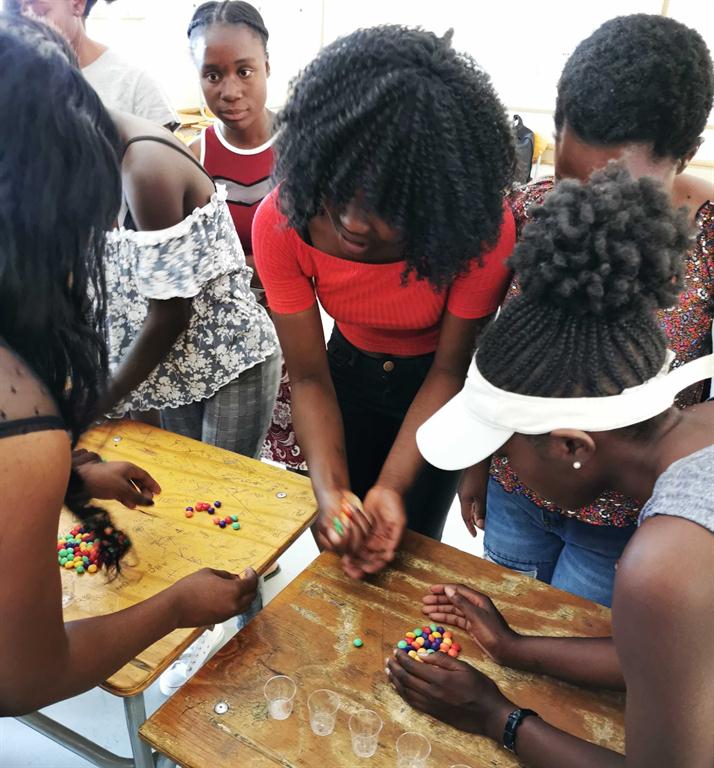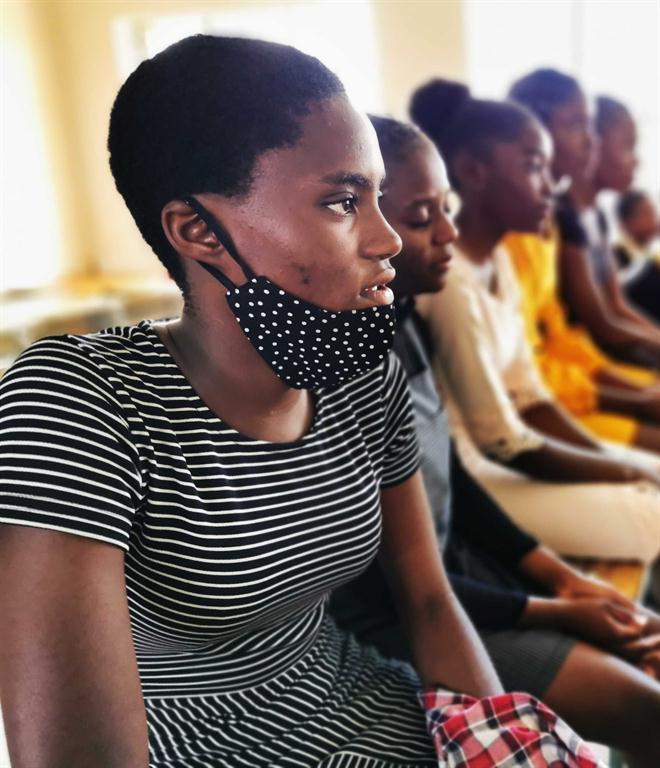GO for girls
Since its inception in September 2020, the Go programme has been supporting and mentoring various girls for vulnerable communities.
Mariselle Stofberg
The Go Programme has been running since September 2020 and is a development programme aimed at servicing the vulnerable communities. Its vision is to see young girls, regardless of their background, nurtured and empowered to reach their full potential.
The programme is school based, operating in one school in Katutura, and catering to girls from two other schools that have joined from word of mouth seeking guidance and support.
“The programme supports 60 young girls in total. Studies done by the United Nations Children’s Fund (UNICEF) have shown that young girls from vulnerable communities are more likely to encounter setbacks in life such as dropping out of school, abuse, pregnancy etc. This means that the critical time to intervene for the youth is now,” said Grace Luvindao, the founder of the programme.
The programme has initialised different initiatives with the girls which have focused on mental health, self-awareness, careers, and sexual health. “There is so much more that we have planned. We engage in these areas through fun engagements like movie days, plays, parties, shows, games, guest speaker opportunities etc. Recently we started a mentor/mentee segment in the programme and are still searching for mentors who can share experiences and guide a young girl’s path to success.”
Luvindao said they have had a bit of a setback due to Covid-19 and the closure of schools, but they still have a well-developed plan in place to kick off again once schools reopen.
Learning through fun
The programme’s moto is fun, which keeps the girls coming back for more, and provides them with the opportunity to acquire and share information.
“The idea of ‘when in Rome, do as the Romans’ strongly applies when relating to young people, and it is so important to adapt approaches that work. Young people like to be heard, want to be engaged with in their ‘language’, and love to have fun. The programme drives that. Although we craft activities, we also allow the girls to share how much value they have received and share their ideas, too, because the GO Programme is for their benefit,” Luvindao said.
Powerful mentorship
The idea of mentorship in the programme is for the girls to tap into the existing knowledge, skills, and experience of individuals who they look up to and are on the same journey. “Mentorship plays a vital role in the GO programme, as it is an opportunity for mentors and mentees alike to zoom into the lives of one another and learn as much as possible. So many young girls are taught on or only have the theory of life. Networking with mentors allows them to navigate the ups and downs of life with practical guidance,” she said.
The programme has collaborated with #projectbefree when they had their series on sexual health.
“I cannot explain the joy that filled the room that day, not only through having learned so much but also knowing that the initiative of the First Lady of Namibia was willing and available to be there, add value and provide some necessary items that many young girls cannot afford,” Luvindao said.
“Young girls fall in the vulnerable segment of communities because they are unfortunately more prone to abuse, early pregnancies, dropping out of school and more. Therefore, I would encourage communities and corporates to donate to an organisation that builds into the lives of young girls and women, support skills for development were necessary, and volunteer to mentor a young girl,” she said.
Luvindao works for the Capricorn Group as the communications and stakeholder engagement practitioner. “I am proud to be associated with an organisation that supports numerous youth initiatives and projects that really builds on skills development, while also creating opportunites for employess to get involved in community development through the Changemaker Programme.”
Luvindao believes this is an example of the impact that should be created by companies in communities.
The programme does not have plans to structurally integrate boys in the future purely because the programme's focus is the girl child. “However, we are looking at uniquely crafted engagements where the girls have opportunities to invite their male friends.”
“I feel loved and respected at GO; it is inspiring and motivational. Plus, we can engage with amazing role models and learn so much,” said Frieda, a grade 10 learner who is part of the project.
The Go Programme has been running since September 2020 and is a development programme aimed at servicing the vulnerable communities. Its vision is to see young girls, regardless of their background, nurtured and empowered to reach their full potential.
The programme is school based, operating in one school in Katutura, and catering to girls from two other schools that have joined from word of mouth seeking guidance and support.
“The programme supports 60 young girls in total. Studies done by the United Nations Children’s Fund (UNICEF) have shown that young girls from vulnerable communities are more likely to encounter setbacks in life such as dropping out of school, abuse, pregnancy etc. This means that the critical time to intervene for the youth is now,” said Grace Luvindao, the founder of the programme.
The programme has initialised different initiatives with the girls which have focused on mental health, self-awareness, careers, and sexual health. “There is so much more that we have planned. We engage in these areas through fun engagements like movie days, plays, parties, shows, games, guest speaker opportunities etc. Recently we started a mentor/mentee segment in the programme and are still searching for mentors who can share experiences and guide a young girl’s path to success.”
Luvindao said they have had a bit of a setback due to Covid-19 and the closure of schools, but they still have a well-developed plan in place to kick off again once schools reopen.
Learning through fun
The programme’s moto is fun, which keeps the girls coming back for more, and provides them with the opportunity to acquire and share information.
“The idea of ‘when in Rome, do as the Romans’ strongly applies when relating to young people, and it is so important to adapt approaches that work. Young people like to be heard, want to be engaged with in their ‘language’, and love to have fun. The programme drives that. Although we craft activities, we also allow the girls to share how much value they have received and share their ideas, too, because the GO Programme is for their benefit,” Luvindao said.
Powerful mentorship
The idea of mentorship in the programme is for the girls to tap into the existing knowledge, skills, and experience of individuals who they look up to and are on the same journey. “Mentorship plays a vital role in the GO programme, as it is an opportunity for mentors and mentees alike to zoom into the lives of one another and learn as much as possible. So many young girls are taught on or only have the theory of life. Networking with mentors allows them to navigate the ups and downs of life with practical guidance,” she said.
The programme has collaborated with #projectbefree when they had their series on sexual health.
“I cannot explain the joy that filled the room that day, not only through having learned so much but also knowing that the initiative of the First Lady of Namibia was willing and available to be there, add value and provide some necessary items that many young girls cannot afford,” Luvindao said.
“Young girls fall in the vulnerable segment of communities because they are unfortunately more prone to abuse, early pregnancies, dropping out of school and more. Therefore, I would encourage communities and corporates to donate to an organisation that builds into the lives of young girls and women, support skills for development were necessary, and volunteer to mentor a young girl,” she said.
Luvindao works for the Capricorn Group as the communications and stakeholder engagement practitioner. “I am proud to be associated with an organisation that supports numerous youth initiatives and projects that really builds on skills development, while also creating opportunites for employess to get involved in community development through the Changemaker Programme.”
Luvindao believes this is an example of the impact that should be created by companies in communities.
The programme does not have plans to structurally integrate boys in the future purely because the programme's focus is the girl child. “However, we are looking at uniquely crafted engagements where the girls have opportunities to invite their male friends.”
“I feel loved and respected at GO; it is inspiring and motivational. Plus, we can engage with amazing role models and learn so much,” said Frieda, a grade 10 learner who is part of the project.






Comments
Namibian Sun
No comments have been left on this article